
Jan Syrový was a Czechoslovak general who was the prime minister of Czechoslovakia during the Munich Crisis.

Lāčplēsis is an epic poem by Andrejs Pumpurs, a Latvian poet, who wrote it between 1872 and 1887 based on local legends. It is set during the Livonian Crusades telling the story of the mythical hero Lāčplēsis "the Bear Slayer". Lāčplēsis is regarded as the Latvian national epic.

Juliusz Karol Wilhelm Józef Rómmel was a Polish military commander, a general of the Polish Armed Forces.

Józef Konstanty Olszyna-Wilczyński was a Polish general and one of the high-ranking commanders of the Polish Army. A veteran of World War I, the Polish-Ukrainian War and the Polish-Soviet War, he was executed by the Soviets during the Invasion of Poland of 1939.

Krišjānis Berķis was a Latvian general. Rising to prominence as an officer of the Latvian Riflemen in World War I, he was promoted to the rank of general during the Latvian War of Independence, and served on the Army General Staff after the war. After the Soviet occupation of the Baltic States, he was deported to Siberia and died in a Gulag labor camp.
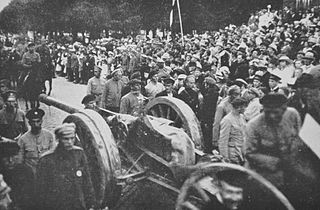
The Latvian War of Independence, sometimes called Latvia's freedom battles or the Latvian War of Liberation, was a series of military conflicts in Latvia between 5 December 1918, after the newly proclaimed Republic of Latvia was invaded by Soviet Russia, and the signing of the Latvian-Soviet Riga Peace Treaty on 11 August 1920.

The Order of Lāčplēsis, the first and the highest Latvian military award, was established in 1919 on the initiative of Jānis Balodis, the Commander of the Latvian Army during the Latvian War of Independence. The Lāčplēsis Order is awarded in the first, second and third class. Initially, a holder of the order had to be a recipient of the third class before being promoted to a higher class. It was named after the Latvian epic hero, Lāčplēsis. As a young man, Lāčplēsis kills a bear with his bare hands and thus the order is also known as the Order of the Bearslayer.
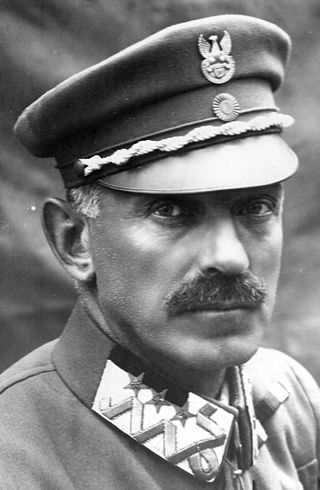
Stanisław Maria Jan Teofil Szeptycki was a Polish count, general and military commander.

Stefan Dąb-Biernacki was a general of the army during the Second Polish Republic. He served as a major general in the Polish Army in overall command of strategic reserve Army "Prusy" during the 1939 German Invasion of Poland.

Jānis Balodis was an army general, Commander-in-Chief of the Armed Forces of Latvia (1919–1921), Minister of War (1931–1940), and a politician who was one of the principal figures during the Latvian War of Independence and the dictatorship of Kārlis Ulmanis, when he was officially the number two of the regime as the Minister of War, Deputy Prime Minister and Vice President.

Lāčplēsis Day is a memorial day for soldiers who fought for the independence of Latvia. It is celebrated on November 11th, marking the decisive victory by the Latvian Army over the joint Russian-German West Russian Volunteer Army led by the warlord Pavel Bermondt-Avalov at the 1919 Battle of Riga during the Latvian War of Independence, thus safeguarding the independence of the nascent nation. It initially was a day of honoring the 743 soldiers that fell in the battles around the Riga area.

Leon Berbecki was a Polish army officer, who fought in the Russo-Japanese War and World War I with the Imperial Russian Army. Following the foundation of the Second Polish Republic, Berbecki served in the Polish Army.

Hugo Celmiņš was a Latvian politician, a public employee, agronomist, twice the Prime Minister of Latvia. Arrested and deported to the USSR after the Soviet occupation of Latvia in 1940, imprisoned in Moscow's Lefortovo Prison. On 30 July 1941 shot and buried in the mass graves of Kommunarka shooting ground. Hugo Celmiņš was one of those who developed agrarian reform in Latvia.
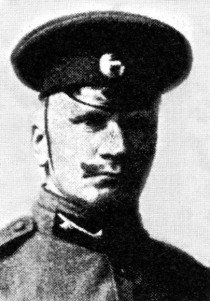
Jorģis Zemitāns was an army officer and commander of the Latvian Northern Brigade during the Latvian War of Independence.

Kaarlo Lauri Torvald Malmberg was a Finnish lieutenant general and son of Emil and Aino Malmberg. He was the Chief of Defence of the Finnish Defence Forces in 1925. General Malmberg served as the Commander-in-Chief of the Finnish Civil Guards from 1921 to 1944, when the organization was abolished as an "anti-Soviet" organization. He also served as the Minister of Defence from 1924 to 1925. At the time there was a power struggle between German-trained and Russian-trained officers in the Defence Forces. His appointment was a good compromise, because on the other hand he represented the White Guards and the German-trained officer faction, but on the other hand his loyalty to the civilian Finnish government was unwavering.
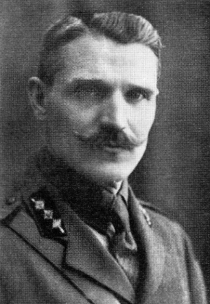
Eduards Kalniņš was a Latvian general. He participated in the Russo-Japanese War and in the Latvian War of Independence. He was Minister of Defence of Latvia in 1926 and 1928 and was recipient of the Latvian military Order of Lāčplēsis, 2nd and 3rd class, and the Estonian Cross of Liberty.

Frīdrihs Briedis was a Latvian colonel and one of the most famous Latvian Riflemen commanders. He was posthumously the recipient of all classes of the Order of Lāčplēsis.
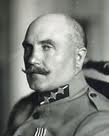
Mārtiņš Peniķis (1874–1964) was a Latvian general and commander in chief of Latvian Army from 1928 to 1934. He was awarded with Order of Lāčplēsis and Order of the Three stars.

Līna Čanka was a Latvian Corporal of World War I and Latvian War of Independence. She was within the 3rd Kurzeme Latvian Rifle Regiment under the pseudonym of "Jānis Čanka" and was known as the first woman to be a recipient of the Order of Lāčplēsis, the highest military award of Latvia.


















